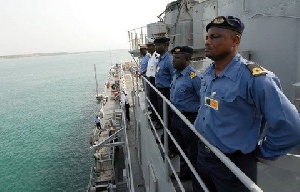The United States and Ghana Navies have undertaken a joint training at the Western Naval Command in Sekondi to strengthen their cooperation in ensuring maritime security and safety.
The programme christened “The African Maritime Law Enforcement Partnership (AMLEP)” is held annually by the two countries to test their readiness to combat the global threat posed by piracy, human and illicit drug trafficking in the maritime industry in the West African sub-region.
This year’s exercise focused on vessel boarding, search and seizure as well as communication familiarization between maritime operation centres and vessels on the sea.
Addressing the media at the close of the two-weeks training exercise, Commodore Tim Ferracci, Mission Commander for Africa Maritime Law Enforcement Partnership, stated that the partnership sought to reinforce the skills of security personnel in real-life operations and improve the detection, boarding, and law enforcement activities that were crucial to maritime security.
He noted that the United States Navy was eager to improve its relationship with partners in the West African sub-region to strengthen regional cooperation and address challenges no one nation could tackle on its own.
“The best way to ensure prosperity is through strong relationships, established in trust with a common goal of increasing safety, stability, and deterring illegal activities.
“The lessons learned and partnerships established over the last couple of weeks are invaluable and we look forward to working with our partners in the future,” he stressed.
Commodore Mark Ransford Nana Banyin Yawson, Flag Officer Commanding the Eastern Naval Command, noted that both countries would constitute legal and regulatory framework to preserve fisheries resources and ensure judicious use of fish stocks for the wellbeing of their peoples.
He added that the exercise had improved the capabilities of the maritime fisheries taskforce and Navy personnel in vessel boarding, search and seizures.
Mr. Emmanuel Marfo, the Deputy Western Regional Director, Fisheries Commission, noted that the Commission was tasked to manage the country’s fisheries resources to ensure its sustainability.
"Therefore, the partnership of the two countries and the Monitoring Control and Surveillance Unit of the Fisheries Commission had upgraded their knowledge and skills to improve maritime security and safety," he added.
The training was undertaken on-board a United States Naval Ship, Spearhead, which has a speed limit of 45 nautical miles per hour and could carry 600 tons of equipment with a 350 passenger-capacity.
Regional News of Monday, 22 February 2016
Source: GNA

















